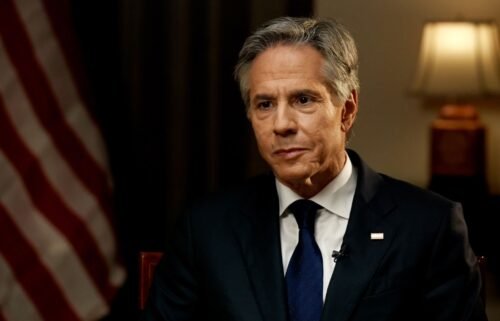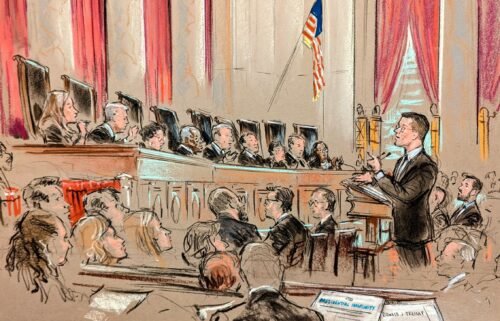McConnell pushing to lock down GOP support for new Covid relief plan as pressure grows to cut a deal
Senate Majority Leader Mitch McConnell is circulating a new relief plan as part of a last-ditch effort to pass a bill to prop up the struggling economy before year’s end, moving to lock down Republican support even as a number of his own members and Democrats push for a different approach.
For days, McConnell has been in private discussions with House Minority Leader Kevin McCarthy, Treasury Secretary Steven Mnuchin and White House chief of staff Mark Meadows, getting a clear sense of what President Donald Trump is willing to sign into law in his final days in office. As McConnell drafts a new bill based on those conversations, Democratic leaders are making their own counteroffer to jumpstart the talks while House Speaker Nancy Pelosi spoke Tuesday to Mnuchin for the first time since late October.
The flurry of activity was a sign of the growing pressure facing party leaders to respond to the deepening crisis with the economy still reeling from the coronavirus pandemic, and as lawmakers race to finish their work for the year before a new Congress is sworn in next month.
But there are still enormous divides between the two parties — and internal party divisions — meaning it’s far from clear whether any proposal stands a chance of becoming law before Trump leaves office on January 20.
“I think the one thing we all agree on is we don’t have time for messaging games, we don’t have time for lengthy negotiations,” McConnell told reporters on Tuesday. “The issue is: we want to get a result and I like to remind everybody that the way you get a result is you have to have a presidential signature.”
McConnell’s move is an implicit rejection of a $908 billion bipartisan plan that a group of senators introduced Tuesday. Rather than embracing that bipartisan proposal, McConnell’s outline resembles a $500 billion GOP proposal that Senate Democrats already blocked twice this year.
GOP Sen. Susan Collins of Maine, who worked with her colleagues on the bipartisan plan, raised objections to his efforts on a private conference call on Tuesday, according to a source on the call. She later seemed cool to McConnell’s push when asked by reporters in the Capitol.
“The advantage of our compromise bill is it has bipartisan, bicameral support,” Collins said. “And we’ll see what the leader introduces. But if it’s identical to what he brought forth this summer, then it’s going to be a partisan bill, and that’s not going to become law. And I want a bill that’s going to become law.”
But the bipartisan plan includes a price tag viewed as too high for many Republicans, plus it includes $160 billion to help state and local governments hurt by the pandemic — an idea that has stiff GOP opposition.
“That’s a big non-starter with a lot of our members,” Senate Majority Whip John Thune, a South Dakota Republican, said Tuesday.
According to a draft of the McConnell plan obtained by CNN, it includes roughly $332 billion in small business assistance programs, and would provide a new round of Paycheck Protection Program loans. It would provide loan forgiveness for the US Postal Service in the amount of $10 billion, a one-month extension of the pandemic emergency unemployment assistance program and an authorization for short-term aid to child care providers.
The plan does not include any money for state and local governments, however, a key Democratic priority.
McConnell indicated Tuesday that Republicans may try to combine the new stimulus proposal with legislation to keep the government funded and prevent a shutdown by the December 11 government funding deadline. But the Senate majority leader will need bipartisan support to accomplish that task.
Stimulus talks have stopped and started repeatedly, but so far Republicans and Democrats have remained deadlocked, despite widespread agreement that more is needed amid fallout from the pandemic.
Before the election, the White House proposed spending around $1.8 trillion, nearing Pelosi’s demand of $2.2 trillion. But the White House’s proposal fell flat with the California Democrat, who objected to many of the details, and Senate Republicans balked at a price tag that they said was far too high as many were unwilling to entertain a number more than $1 trillion. Talks between Pelosi and Mnuchin ultimately collapsed.
There has been renewed pressure in recent days from rank-and-file members on their leadership to pass some form of stimulus as the country faces a cliff at the end of the year when multiple provisions will expire, leading to the bipartisan plan that rolled out Tuesday morning in the Senate that comes with a price tag of $908 billion.
Privately, Pelosi and Senate Minority Leader Chuck Schumer made their own counter-proposal to McConnell on Monday evening. Schumer refused to disclose the details of the plan.
But he took a shot at McConnell for trying to advance a new GOP proposal without consulting Democrats.
“I just heard Leader McConnell say he’s going to put another partisan proposal on the floor, he’s going to talk to McCarthy and Trump and put something on the floor,” Schumer said. “The obvious fact of the matter is, the biggest impediment to getting an agreement is the Republican leader refusing to negotiate in a bipartisan way.”
After her conversation with Mnuchin, Pelosi said in a statement that the Treasury secretary would review their proposal.
“Additional Covid relief is long overdue and must be passed in this lame-duck session,” she said.



